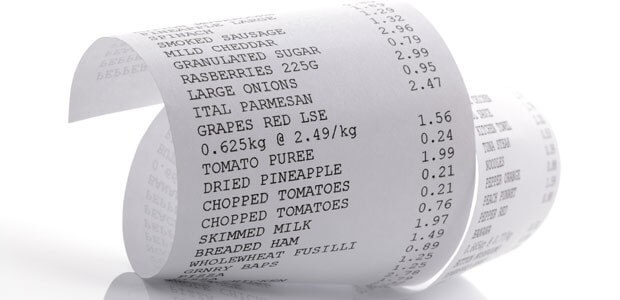The latest episode in the American Chemical Society’s (ACS) award-winning “Global Challenges/Chemistry Solutions” podcast series discusses the discovery of bisphenol A (BPA) in 94 percent of thermal cash register receipts and describes how recycling of those receipts spreads BPA to paper napkins, toilet paper and other paper products.
In the podcast, Kurunthachalam Kannan, Ph.D., explains that manufacturers produce more than 8 billion pounds of BPA worldwide every year. Research links BPA with certain harmful health effects. BPA has been used in plastic water bottles, the lining of food cans and a variety of other products. But how much do non-food sources contribute to BPA exposure? BPA coats the surfaces of thermal receipts, where it acts as a developer for the printing dye. To see whether this source of BPA was a concern, the researchers analyzed hundreds of samples of thermal cash register receipts and 14 other paper types from the U.S., Japan, Korea and Vietnam.
They found BPA on 94 percent of all the receipts. The only receipts with that were BPA-free were those from Japan, which phased out this use of BPA in 2001. BPA was in most of the other types of paper products, with tickets, newspapers and flyers having the highest concentrations. But these levels still paled in comparison to BPA on receipts, which the study said are responsible for more than 98 percent of consumer exposure to BPA from paper. The researchers estimate that receipts contribute about 33.5 tons of BPA to the environment every year in the U.S. and Canada. They note that handling of paper products can contribute up to 2 percent of the total daily BPA exposures in the general population, and that fraction can be much higher in occupationally exposed individuals.
The new podcast is available without charge at iTunes and from www.acs.org/globalchallenges.
Global Challenges/Chemistry Solutions is a series of podcasts describing some of the 21st century’s most daunting problems, and how cutting-edge research in chemistry matters in the quest for solutions. Global Challenges is the centerpiece in an alliance on sustainability between ACS and the Royal Society of Chemistry. Global Challenges is a sweeping panorama of global challenges that includes dilemmas such as providing a hungry, thirsty world with ample supplies of safe food and clean water; developing alternatives to petroleum to fuel society; preserving the environment and assuring a sustainable future for our children and improving human health. During the 2011 global celebration of the International Year of Chemistry (IYC), Global Challenges/Chemistry Solutions also is focusing on the main themes of IYC — health, environment, energy and materials.
For more entertaining, informative science videos and podcasts from the ACS Office of Public Affairs, view Prized Science, Spellbound, Science Elements and Global Challenges/Chemistry Solutions.
The American Chemical Society is a nonprofit organization chartered by the U.S. Congress. With more than 163,000 members, ACS is the world’s largest scientific society and a global leader in providing access to chemistry-related research through its multiple databases, peer-reviewed journals and scientific conferences. Its main offices are in Washington, D.C., and Columbus, Ohio.
To automatically receive news releases from the American Chemical Society contact [email protected]



Quantum life distributes quantum Biofeedback Devices, quantum ilife app, cem tech milli Wave therapy, scalar wave laser, quantum wave laser and the life system biofeedback device including Qxci and indigo biofeedback.